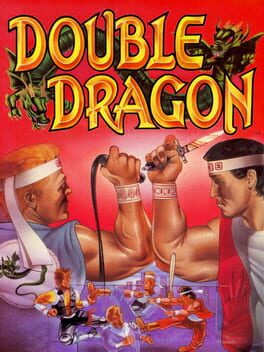The first minutes of Double Dragon capture a sensation of immediacy and rawness that is palpable even today. The very first thing you see a literal punch in the guts: a woman getting assaulted and abducted on the street in broad daylight. The music starts kicking in and you are dropped into the same alley, immediately getting attacked by a bunch of thugs. The initial act of violence against the woman still echoes in your head as you commence your relentless rampage of revenge. There are no signs of civil life left in this postindustrial wasteland of a city (an important difference from the arcade version). You punch and kick your way through empty streets and abandoned construction sites – it feels like moving through a corpse of stone and metal. Notions of honor or fair play have long ceased to exist among the roaming gangs, and the thugs won’t hesitate to throw knives or explosives right in your face. Any means to get the upper hand are allowed, so you better adapt quickly and use the enemies’ weapons yourself or push your foes into bottomless pits. Apart from the goal to rescue the girl, the game makes no effort to distinguish the player character from his opponents, neither in appearance nor movement. This is a world of sheer brute force, harsh and unhinged. And it is a great opening for a video game, where it’s immediately clear why it became so influential, both terms in gameplay and style.
However, things start to fall apart quickly after the first two levels. The environmental design loses its focus as the game leaves his urban setting behind in place of generic woods and caves. No new enemy types get introduced anymore, and since there are never more than two enemies on screen at once, the challenge stagnates. Unlocking more moves over time is satisfying but it still becomes apparent how unpolished the combat system actually is. Too often it feels like the game decides randomly whether you or your opponent gets hit first unless you figure out how to cheese your way through every encounter with the same simple tactics. Instead, the game ramps up the difficulty by adding random bullshit like unfair environmental traps and awkward platforming sections, even though the controls clearly were not meant for this kind of challenge. It is also at this point that the levels begin to drag on for far longer, further reinforcing the impression of artificial difficulty. After a while I felt no shame using quick saves to make it through to the end. Double Dragon honestly would have been a better game if it had ended after the second level, even if that means it only lasted for five glorious minutes.
__________________
More NES reviews
Castlevania
The Legend of Zelda
Super Mario Bros.
However, things start to fall apart quickly after the first two levels. The environmental design loses its focus as the game leaves his urban setting behind in place of generic woods and caves. No new enemy types get introduced anymore, and since there are never more than two enemies on screen at once, the challenge stagnates. Unlocking more moves over time is satisfying but it still becomes apparent how unpolished the combat system actually is. Too often it feels like the game decides randomly whether you or your opponent gets hit first unless you figure out how to cheese your way through every encounter with the same simple tactics. Instead, the game ramps up the difficulty by adding random bullshit like unfair environmental traps and awkward platforming sections, even though the controls clearly were not meant for this kind of challenge. It is also at this point that the levels begin to drag on for far longer, further reinforcing the impression of artificial difficulty. After a while I felt no shame using quick saves to make it through to the end. Double Dragon honestly would have been a better game if it had ended after the second level, even if that means it only lasted for five glorious minutes.
__________________
More NES reviews
Castlevania
The Legend of Zelda
Super Mario Bros.
